 |
The Saint of the Day
St. Louis IX, King of France, August 25
Prof. Plinio Corrêa de Oliveira
Biographical selection:
The following text from the Book of Wisdom is habitually applied to St. Louis:
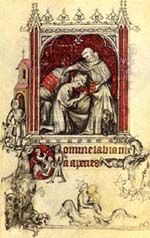
|  |
St. Louis submits to penance by his confessor
Illuminations from The Hours of Jeanne D'Evreau, Queen of France
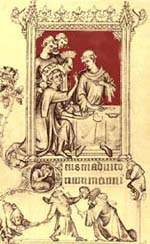
St. Louis feeds a leprous monk
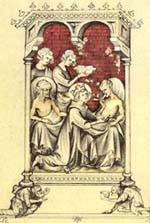
St. Louis administers to the sick
|
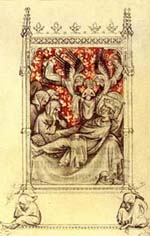
St. Louis died August 25, 1270 on his second crusade |
 |
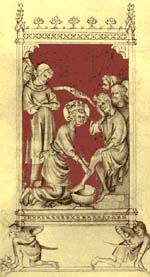 |
 |
St. Louis washes the feet of the poor
|
 |
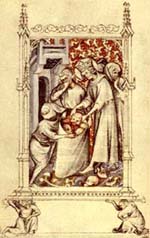 |
 |
St. Louis helps to bury crusaders who died at Sidon in 1253
|
 |
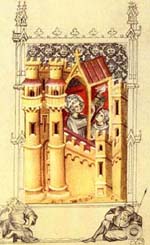
While prisoner of the Arabs, his breviary was lost and miraculously returned
|
 |
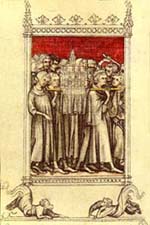 |
 |
On August 25, 1398 Louis IX of France was beatified and his relics carried in procession in Paris |
“Hear, therefore, ye kings, and understand; learn, ye that are judges of the ends of the earth. Give ear, you that rule the people, and that please yourself in the multitude of nations: For power is given you by the Lord, and strength by the Most High, who will examine your works, and search out your thoughts ...
“To you, therefore, O kings, these are my words, that you may learn wisdom, and not fall from it. For they that have kept just things justly, shall be justified: and they that have learned these things, shall find what to answer.
"Covet ye, therefore, my words, and love them, and you shall have instruction. Wisdom is glorious, and never fadeth away, and is easily seen by them that love her, and is found by them that seek her” (6:2-4; 10-12).
Comments of Prof. Plinio:
St. Louis was a wise King in the full sense of the word, because the truly wise one is not the scientist who knows many facts, but the saint.
What is wisdom? It is the fundamental virtue by which man knows the most profound aspect of things, the ultimate reality of things. It is the virtue that allows one to penetrate and understand not only this or that subject, but the whole universe, the cosmos. It is wisdom that permits one to understand the meaning of one’s own existence, the meaning of human life in general, and the meaning of the ensemble of other created things.
How does one understand the ultimate reality of things? It is to know what the things are, what they represent, what they exist for. But wisdom is not just to understand. It is to understand in order to lead one’s life and order one’s actions in accordance with the answer one finds to these questions.
There is, then, an opposition between the wise man and the foolish one. The foolish man is the one who is not concerned about these things. He only wants to enjoy himself. He does not want to know the ultimate reason for things, the reality that is behind appearances. He does not want to adapt his life to principles. He just wants to enjoy a good life - not necessarily an immoral life, but a life where he does not have to think about anything profound. To live a life like this is a complete absence of wisdom.
How many good ladies do you know who take reasonable care of their family duties, assist at Mass, go to confession, receive Holy Communion, but do not have wisdom? Certainly there are many. They do all these good things, but afterwards they are immersed in their little mediocre lives without any profound thought.
In his Treatise on Eternal Wisdom St. Louis de Montfort explains that wisdom is a presupposition of the Faith. Without wisdom the Faith can exist, but it lacks a foundation. Our Lady was the Seat of Wisdom and was always seeking to increase her knowledge, love and service of God.
This virtue is demanded of kings, governors and all who exercise some form of power. A king without wisdom loses his people. When he has wisdom, he saves his people and is the glory of his people. For a man without wisdom, power becomes an instrument of his perdition.
Hence, we can understand the magnificent eulogy Scriptures made of the wise king. He leads peoples and things to their final end, which is God. This is the ultimate meaning of his kingship.
What we admire in St. Louis, King of France, is the model of a wise man placed on the throne to govern his kingdom.
We should ask him to give us the precious virtue of wisdom.


  | | Prof. Plinio Corrêa de Oliveira | |
The Saint of the Day features highlights from the lives of saints based on comments made by the late Prof. Plinio Corrêa de Oliveira. Following the example of St. John Bosco who used to make similar talks for the boys of his College, each evening it was Prof. Plinio’s custom to make a short commentary on the lives of the next day’s saint in a meeting for youth in order to encourage them in the practice of virtue and love for the Catholic Church. TIA thought that its readers could profit from these valuable commentaries.
The texts of both the biographical data and the comments come from personal notes taken by Atila S. Guimarães from 1964 to 1995. Given the fact that the source is a personal notebook, it is possible that at times the biographic notes transcribed here will not rigorously follow the original text read by Prof. Plinio. The commentaries have also been adapted and translated for TIA’s site.
|
Saint of the Day | Home | Books | CDs | Search | Contact Us | Donate

© 2002- Tradition in Action, Inc. All Rights Reserved
|
 |

|